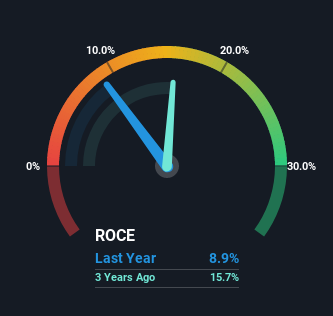Vesuvius India (NSE:VESUVIUS) Is Reinvesting At Lower Rates Of Return

If we want to find a potential multi-bagger, often there are underlying trends that can provide clues. One common approach is to try and find a company with returns on capital employed (ROCE) that are increasing, in conjunction with a growing amount of capital employed. Ultimately, this demonstrates that it's a business that is reinvesting profits at increasing rates of return. However, after briefly looking over the numbers, we don't think Vesuvius India (NSE:VESUVIUS) has the makings of a multi-bagger going forward, but let's have a look at why that may be.
What is Return On Capital Employed (ROCE)?
For those who don't know, ROCE is a measure of a company's yearly pre-tax profit (its return), relative to the capital employed in the business. The formula for this calculation on Vesuvius India is:
Return on Capital Employed = Earnings Before Interest and Tax (EBIT) ÷ (Total Assets - Current Liabilities)
0.089 = ₹821m ÷ (₹12b - ₹2.7b) (Based on the trailing twelve months to March 2022).
Thus, Vesuvius India has an ROCE of 8.9%. Ultimately, that's a low return and it under-performs the Machinery industry average of 14%.
Check out our latest analysis for Vesuvius India

Historical performance is a great place to start when researching a stock so above you can see the gauge for Vesuvius India's ROCE against it's prior returns. If you want to delve into the historical earnings, revenue and cash flow of Vesuvius India, check out these free graphs here.
How Are Returns Trending?
In terms of Vesuvius India's historical ROCE movements, the trend isn't fantastic. Over the last five years, returns on capital have decreased to 8.9% from 22% five years ago. However, given capital employed and revenue have both increased it appears that the business is currently pursuing growth, at the consequence of short term returns. And if the increased capital generates additional returns, the business, and thus shareholders, will benefit in the long run.
In Conclusion...
In summary, despite lower returns in the short term, we're encouraged to see that Vesuvius India is reinvesting for growth and has higher sales as a result. However, total returns to shareholders over the last five years have been flat, which could indicate these growth trends potentially aren't accounted for yet by investors. As a result, we'd recommend researching this stock further to uncover what other fundamentals of the business can show us.
One more thing: We've identified 2 warning signs with Vesuvius India (at least 1 which is a bit concerning) , and understanding these would certainly be useful.
While Vesuvius India isn't earning the highest return, check out this free list of companies that are earning high returns on equity with solid balance sheets.
New: Manage All Your Stock Portfolios in One Place
We've created the ultimate portfolio companion for stock investors, and it's free.
• Connect an unlimited number of Portfolios and see your total in one currency
• Be alerted to new Warning Signs or Risks via email or mobile
• Track the Fair Value of your stocks
Have feedback on this article? Concerned about the content? Get in touch with us directly. Alternatively, email editorial-team (at) simplywallst.com.
This article by Simply Wall St is general in nature. We provide commentary based on historical data and analyst forecasts only using an unbiased methodology and our articles are not intended to be financial advice. It does not constitute a recommendation to buy or sell any stock, and does not take account of your objectives, or your financial situation. We aim to bring you long-term focused analysis driven by fundamental data. Note that our analysis may not factor in the latest price-sensitive company announcements or qualitative material. Simply Wall St has no position in any stocks mentioned.
About NSEI:VESUVIUS
Excellent balance sheet with moderate growth potential.
Similar Companies
Market Insights
Community Narratives



